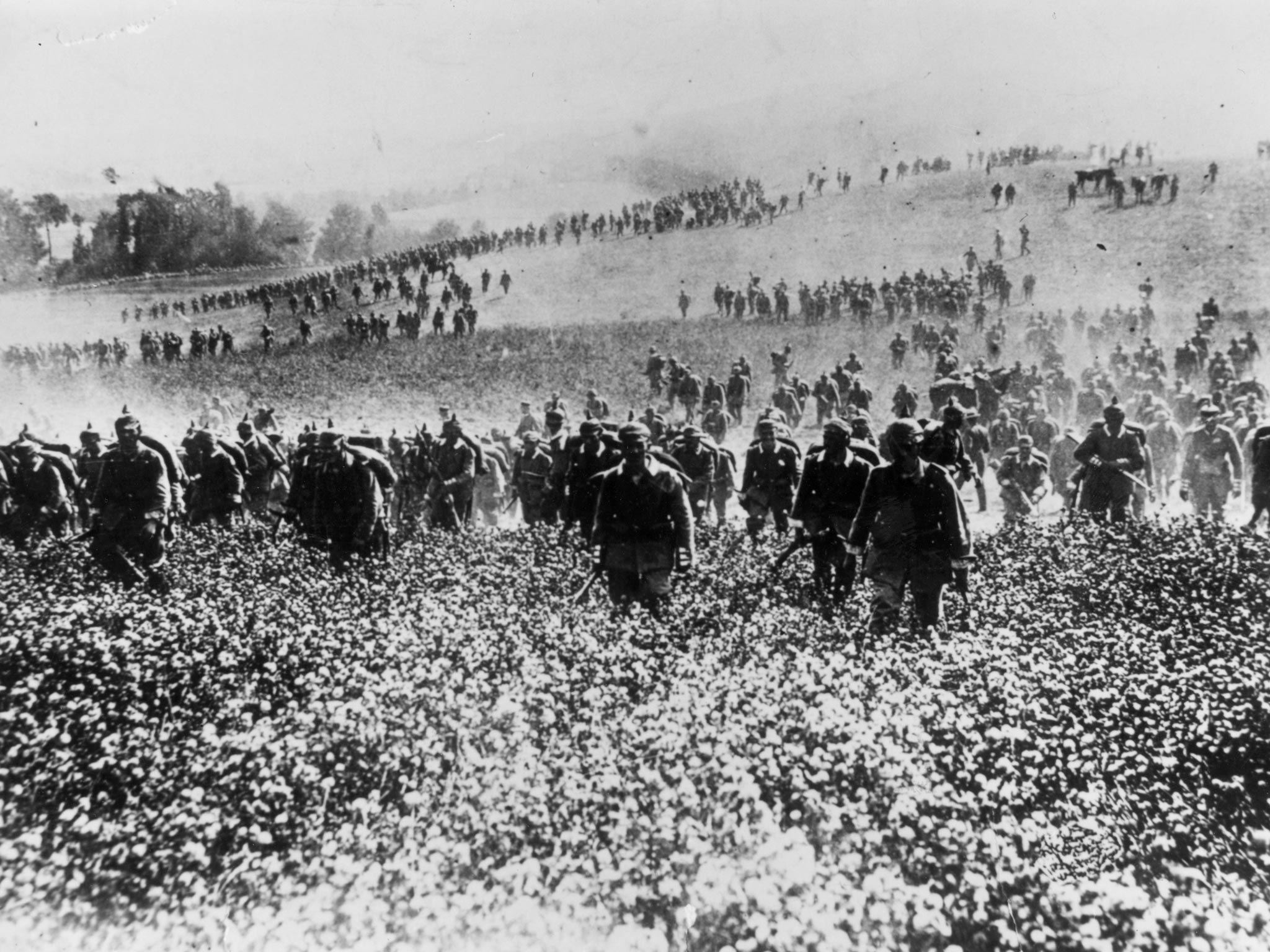A History of the First World War in 100 Moments: The Germans advance into Brussels
No.4 Belgium, 21 August 1914: Our 100-day series marking the centenary of the First World War continues with a report by US journalist Richard Harding Davis on the German war machine’s unstoppable progress into neutral Belgium

The entrance of the German army into Brussels has lost the human quality. It was lost as soon as the three soldiers who led the army bicycled into the Boulevard du Régent and asked the way to the Gare du Nord. When they passed, the human note passed with them. What came after them, and 24 hours later is still coming, is not men marching, but a force of nature like a tidal wave, an avalanche or a river flooding its banks. At this minute it is rolling through Brussels as the swollen waters of the Conemaugh Valley swept through Johnstown.
At the sight of the first few regiments of the enemy we were thrilled with interest. After they had passed for three hours in one unbroken steel-grey column we were bored. But when hour after hour passed and there was no halt, no breathing time, no open spaces in the ranks, the thing became uncanny, inhuman. You returned to watch it, fascinated. It held the mystery and menace of fog rolling toward you across the sea.
The grey of the uniforms worn by both officers and men helped this air of mystery. Only the sharpest eye could detect among the thousands that passed the slightest difference. All moved under a cloak of invisibility. Only after the most numerous and severe tests, with all materials and combinations of colour that give forth no colour, could this grey have been discovered. That it was selected to clothe and disguise the German when he fights is typical of the German Staff in striving for efficiency to leave nothing to chance, to neglect no detail.
After you have seen this service uniform under conditions entirely opposite you are convinced that for the German soldier it is his strongest weapon. Even the most expert marksman cannot hit the target unless he can see. It is a grey-green, not the blue-grey of our Confederates. It is the grey of the hour just before daybreak, the grey of unpolished steel, of mist among green trees...
This army has been on active service three weeks, and so far there is not apparently a chin-strap or a horseshoe missing. It came in with the smoke pouring from cookstoves on wheels, and in an hour had set up post office wagons, from which mounted messengers galloped along the line of column distributing letters and at which soldiers posted picture postcards.
The infantry came in files of five, 200 men to each company; the lancers in columns of four, with not a pennant missing. The quick-firing guns and field pieces were one hour at a time in passing, each gun with its caisson and ammunition wagon taking 20 seconds in which to pass.
The men of the infantry sang “Fatherland, My Fatherland”. Between each line of song they took three steps. At times 2,000 men were singing together in absolute rhythm and beat. When the melody gave way, the silence was broken only by the stamp of ironshod boots, and then again the song rose. When the singing ceased, the bands played marches. They were followed by the rumbles of siege guns, the creaking of wheels and of chains clanking against the cobble-stones and the sharp bell-like voices of the bugles.
For seven hours the army passed in such solid column that not once might a taxi-cab or trolley car pass through the city. Like a river of steel it flowed, grey and ghostlike. Then, as dusk came and a thousands of horses’ hoofs and thousands of iron boots continued to tramp forward, they struck tiny sparks from the stones, but the horses and men who beat out the sparks were invisible.
At midnight, pack wagons and siege guns were still passing. At seven this morning I was awakened by the tramp of men and bands playing jauntily. Whether they marched all day or not I do not know; but for 26 hours the grey army rumbled with the mystery of fog and the pertinacity of a steamroller.
First published in the News Chronicle, 23 August 1914
Tomorrow: ATROCITIES IN SERBIA ‘A History of the Great War in 100 Moments’ continues daily, in The Independent and The Independent on Sunday, until 12 July
Join our commenting forum
Join thought-provoking conversations, follow other Independent readers and see their replies
Comments
Bookmark popover
Removed from bookmarks